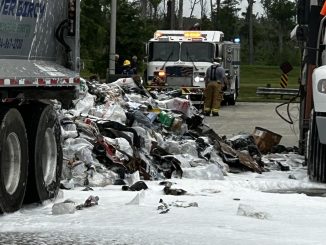
For men and the women who love them… Prostate Q-&-A with parish doctors can save your life
In this week’s Herald-Guide Health Report, Drs. Brian Brogle and Stephen Lacour of the St. Charles Parish Hospital address prostate health for men. Frequent urination, an inability to urinate, back pain and sexual dysfunction are symptoms of prostate problems, the causes of which are usually benign but may signal cancer. They also explain how cancer is diagnosed and your treatment options. Read this important report – then pass it along to someone you love.
And don’t forget to check back next week for another Health Report – ONLY in the Herald-Guide.Q. What is the prostate? Where is it located? What is its function?
A. The prostate is a gland that is part of the male reproductive system. Under normal conditions, the prostate is about the size of a walnut. It is located just below the bladder and in front of the rectum, and it surrounds part of the urethra – the tube that carries urine from bladder. The prostate produces and stores a component of semen called “prostatic fluid.”
Q. Who is at the greatest risk of developing prostate cancer?
A. All men are at risk. The most common risk factor is age. More than 70 percent of men diagnosed with prostate cancer are over the age of 65. African American men are at higher risk than other men, and those with diets that are high in fat also are at high risk. Genetics are also a factor. If lots of men in your family have been diagnosed with prostate cancer, you risk also is high.
Q. What are common symptoms of Prostate Cancer?
A. Often, prostate cancer does not cause symptoms for years. When symptoms do occur the disease may have already spread beyond the prostate.
The most common symptoms are:
• Frequent urination, especially at night
• Inability to urinate
• Trouble starting or holding back urine
• A weak or interrupted flow of urine
• Painful or burning urination
• Blood in urine or semen
• Painful ejaculation
• Frequent pain in the lower back, hips, or upper thighs.
As men get older their prostate will often grow larger and restrict or block the flow of urine or interfere with sexual function. These are symptoms of a common condition called Benign Prostatic Hyperplasia. BPH is not cancer but it can cause some of the same symptoms as prostate cancer. Although not cancerous, BPH may require treatment with medicine or surgery to relieve the symptoms.
Q. How is prostate cancer diagnosed?
A. Prostate-specific antigen (PSA) is a protein produced by the cells of the prostate gland. The PSA test is a screening that measures the level of PSA in the blood. PSA levels alone do not give doctors enough information to distinguish between benign prostate conditions and cancer. The diagnosis of prostate cancer can be confirmed only by a biopsy.
Q. What are some common treatments for Prostate Cancer?
A. Radical Prostatectomy is a surgical procedure in which the entire prostate gland is removed along with nearby tissues. Radiation Therapy involves the delivery of radiation to the prostate. Hormone Therapy is the use of drugs or surgery to decrease the production of male hormones in order to limit the growth of prostate cancer.
Cryosurgery is a procedure in which the prostate gland is frozen under controlled conditions in order to kill cancer cells. Surveillance involves close monitoring of the patient and is usually recommended for elderly patients or those who have other serious medical conditions.
Contact information for this week’s experts: Dr. Brian Bogle and Dr. Stephen LaCour practice medicine in St. Charles Parish and can be reached at 985-785-5620. If you have a question you’d like the Herald-Guide to address in a future issue, e-mail annt@heraldguide.com or send your a letter to Herald-Guide Health Report, P.O. Box 1199, Boutte, LA 70039-1199.




Be the first to comment